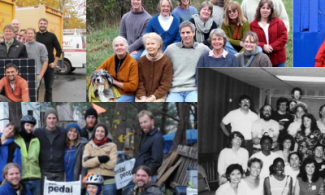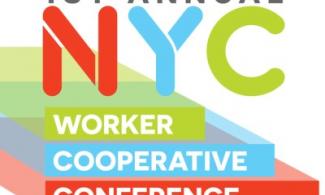Workers' control at Fralib: the brand with the Elephant
In France there are two cases of recuperated factories occupied by workers during the current crisis. One is the Pilpa Ice Cream Factory, which just started producing organic ice cream and yoghurt as a worker-owned and administered company after a long-lasting struggle. The other is the Fralib Tea Factory. Both were closed by their huge multinational owners to relocate production.

 In
In 
 The consumer is beginning to understand that corporate ag is not anybody’s friend. We need to see to it that we aren’t seen as “corporate ag, only smaller.”
The consumer is beginning to understand that corporate ag is not anybody’s friend. We need to see to it that we aren’t seen as “corporate ag, only smaller.” A movement is emerging in many places, under many guises: New Economy (or Economies), Regenerative Economy, Solidarity Economy, Next Economy, Caring Economy, Sharing Economy, Thriving Resilience, Community Resilience, Community Economics, Oppositional Economy, High Road Economy, and other names.
A movement is emerging in many places, under many guises: New Economy (or Economies), Regenerative Economy, Solidarity Economy, Next Economy, Caring Economy, Sharing Economy, Thriving Resilience, Community Resilience, Community Economics, Oppositional Economy, High Road Economy, and other names. Compared to the second quarter of 2013,
Compared to the second quarter of 2013, 
 The village shop is a cornerstone of rural communities – but they are closing at the rate of 400 a year. Thankfully, the co-op movement is filling the gap, in the form of the village-owned store. There are now more than 300 in operation, compared to 27 just 20 years ago – but how do these small community co-ops engage such a small membership?
The village shop is a cornerstone of rural communities – but they are closing at the rate of 400 a year. Thankfully, the co-op movement is filling the gap, in the form of the village-owned store. There are now more than 300 in operation, compared to 27 just 20 years ago – but how do these small community co-ops engage such a small membership? Whatever its form, worker ownership should appeal to both liberals and conservatives for very different reasons. For liberals, worker ownership is a way for workers to increase their earnings while dispersing ownership in companies and possibly inch toward some semblance of economic democracy.
Whatever its form, worker ownership should appeal to both liberals and conservatives for very different reasons. For liberals, worker ownership is a way for workers to increase their earnings while dispersing ownership in companies and possibly inch toward some semblance of economic democracy.

 Earlier this month, the small city of
Earlier this month, the small city of  On remote Deer Isle, Maine, the movement for a more just and democratic economy won a major victory this summer.
On remote Deer Isle, Maine, the movement for a more just and democratic economy won a major victory this summer. Over the past decade, the Riverwest neighborhood has incubated a handful of small but exemplary cooperatives. People's Books (804 E. Center St.) converted from a sole proprietorship to a consumer-owned cooperative in 2007. In addition to selling books, it is home to an after-school program for neighborhood kids. The Riverwest Co-op & Cafe (801 E.
Over the past decade, the Riverwest neighborhood has incubated a handful of small but exemplary cooperatives. People's Books (804 E. Center St.) converted from a sole proprietorship to a consumer-owned cooperative in 2007. In addition to selling books, it is home to an after-school program for neighborhood kids. The Riverwest Co-op & Cafe (801 E. Since the first community supported agriculture program was established in western Massachusetts in the 1980s, the concept of buying food directly from local farms has taken off. There are now thousands of CSAs across the country.
Since the first community supported agriculture program was established in western Massachusetts in the 1980s, the concept of buying food directly from local farms has taken off. There are now thousands of CSAs across the country.